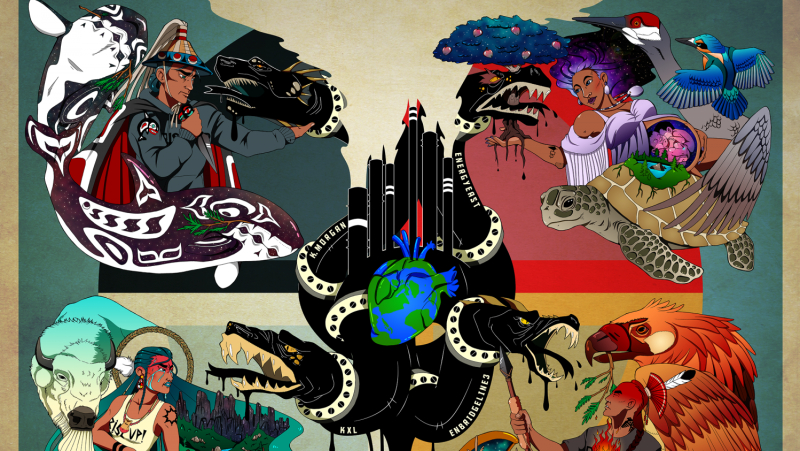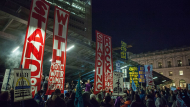Indigenous leaders launch new campaign to defund all four proposed tar sands pipelines

Today, a coalition of grassroots Indigenous groups from across Turtle Island joins the 121 First Nations and Tribes united by the Treaty Alliance Against Tar Sands Expansion, to launch a new, integrated divestment campaign against the banks funding Dakota Access and the four tar sands crude oil pipelines currently proposed out of Canada.
“We call on all banks and financial institutions to withdraw their investments in the corporations proposing to build new pipelines to carry even more tar sands oil out of Canada,” says Grand Chief Derek Nepinak of the Assembly of Manitoba Chiefs on behalf of the Treaty Alliance Against Tar Sands Expansion. “We call on individuals, businesses, organizations, and governments to withdraw their money from these financial institutions until they divest from these pipeline companies who are violating our rights, our treaties and our sovereignty. We stand in solidarity with the Tribes of the Great Sioux Nation and all communities impacted by the Dakota Access Pipeline, and also call for divestment from any financial institution invested in Energy Transfer Partners.”
“Much of my community is under water right now due to historic flooding - these are the climate fuelled disasters that banks are funding by pumping money into these pipeline projects” says Grand Chief Serge Simon of the Mohawk Council of Kanesatake, on behalf of the Treaty Alliance Against Tar Sands Expansion. “We cannot allow Big Oil to divide us or weaken our resistance: every one of these four tar sands pipelines needs to be stopped in order to stop the expansion of the Alberta Tar Sands. We stand united in the protection of our water, our communities, our climate, and our ways of life as First Peoples.”
The Mazaska Talks website (“mazaska” is Lakota for “money”) is a centralized resource for this campaign, with detailed financial data as well as tools for taking action. The campaign targets all 61 banks that currently provide financing to Energy Transfer Partners or the three companies proposing new tar sands pipelines: TransCanada (Keystone XL and Energy East), Kinder Morgan (TransMountain Expansion), and Enbridge (Line 3 Expansion). Enbridge was also the company behind the proposed Northern Gateway tar sands pipeline, which was defeated by First Nations and popular resistance in 2016. A list of primary targets includes the 17 banks that fund all of these companies, as well as the convenors of major multi-bank credit facilities: Bank of America, Bank of Montreal, Barclays, BNP Paribas, CIBC, Citi, Crédit Agricole, Credit Suisse, Deutsche Bank, JPMorgan Chase, Mizuho, MUFG, RBC, SMBC, ScotiaBank, TD Bank, and Wells Fargo.
"Divestment is the next stage in the fight against the black snake that has come to poison our lands," says Matt Remle of Last Real Indians, a leader of the coalition that successfully pushed the City of Seattle to divest over $3 billion from DAPL banks earlier this year. "Big oil and their financial backers are not persuaded by moral and environmental arguments, so it is time to hit them in the pocket book. The resistance at Standing Rock changed the world - Indigenous Nations are rising up to create a future with clean water and respect for human rights."
So far, the divestment movement launched during the resistance at Standing Rock has successfully withdrawn over $5 billion from DAPL-funding banks, including money from 3 major US cities and over $80 million in individual accounts. Three European banks have sold their shares of loans to the pipeline company in response to public pressure - DNB of Norway, ING of the Netherlands, and BNP Paribas of France.
“These companies may not listen to morality, but they do listen to money,” says Tara Houska, National Campaigns Director of Honor the Earth and part of an Indigenous women’s delegation that traveled to Norway and Switzerland to meet directly with several banks and Norway’s oil fund. “Many of these banks already have human rights directives in place and all should have policies respecting Indigenous communities. Financiers should follow their own rules. Passing the blame onto companies committing atrocities and a federal government willing to overrun its citizens’ rights for profit is unacceptable - we are consumers, we have agency and we have a say in how our money is invested.”
This new campaign to defund the tar sands pipelines comes at a time of unprecedented economic vulnerability in the tar sands industry, due to consistently low oil prices and the extremely high cost of tar sands extraction. Major oil companies have been withdrawing investments from the tar sands steadily over the past two years.



